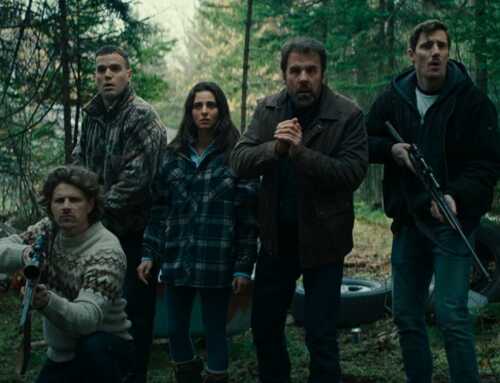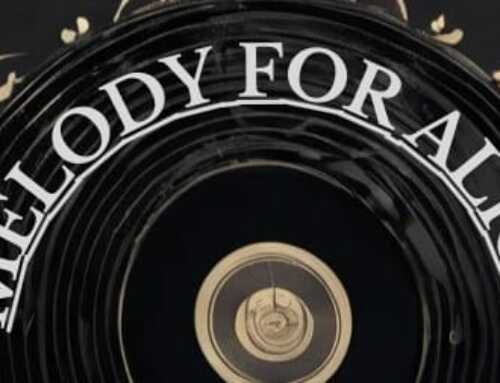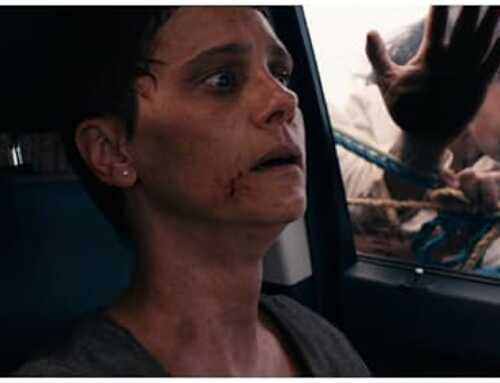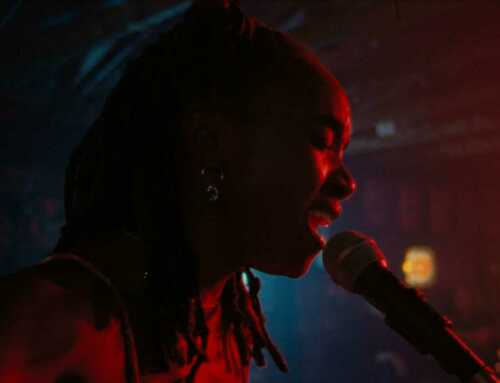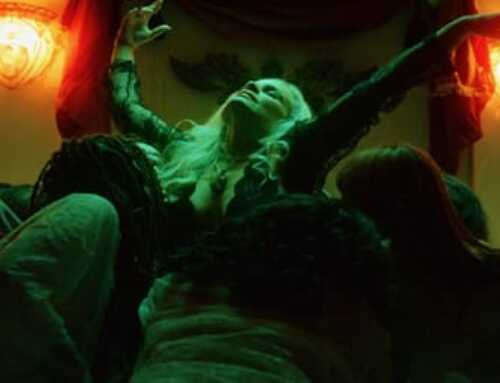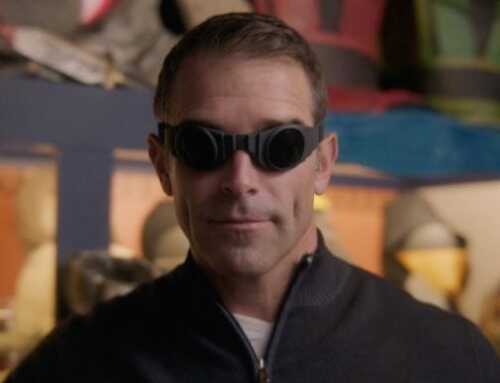Today we speak with writer, director, Nathalie Biancheri of the new thriller WOLF arriving in theatres on December 3. Believing he is a wolf trapped in a human body, Jacob (George MacKay) eats, sleeps, and lives like a wolf – much to the shock of his family. When he’s sent to a clinic, Jacob and his animal-bound peers are forced to undergo increasingly extreme forms of ‘curative’ therapies. However, once he meets the mysterious Wildcat (Lily-Rose Depp), and as their friendship blossoms into an undeniable infatuation, Jacob is faced with a challenge: will he renounce his true self for love. Focus Features will release WOLF theaters on December 3, 2021
HorrorBuzz: Natalie, hi!
Nathalie Biancheri: Hi.
HB: Hi. Um, we are here to talk about your new film from Focus Features, Wolf. And that’s coming out December 3rd of this year. Um, that, it was a pretty trippy movie. Um, and what inspired this story?
NB: So, I had, um, basically seen a little news piece about a woman who, um, believed that she was a cat. And the news piece itself was, like, little bit maybe tiny bit sensationalistic, but, like, I just didn’t know anything about species dysphoria. So, I kind of started looking into it and discovered that it, you know, is this syndrome which is actually growing. It’s on the rise, it’s amongst teenagers, and I very briefly considered whether I wanted to make a documentary about it, but then kind of upon, like, self-examining what I wanted to, like, look at it wasn’t so much species dysphoria as a real condition in a medical sense, you know, in the world. But rather this idea that kind of was triggered from finding out about it. Which is, you know, on the one hand a person might choose to inhabit an animal. Like, act like an animal, feel like that animal, dress like that animal, and why? You know, what would, about our world or about their life or about, perhaps, alienation from nature might compel them to make this decision? Um, and also, on the other hand, like, on the almost let’s say opposite side of the thesis, um, someone who actually hasn’t chosen this at all and has always intrinsically felt that they are an animal. Even though it’s something that’s so different from being a human, to a certain extent, but yes, or certainly existing as a human in our life. And what that means to carry that weight and question and pain and difficulty of existing. Um, and so really it was those two different thoughts that were triggered by learning about species dysphoria. Which brought me to create, you know, a world in which they could exist and has, like, an institution in which they could be cured. Um, and a sort of array of characters, which to different degrees inhabit those different thoughts.
HB Well, I mean that, that begs so many questions, but your two leads, Wildcat and Jacob, or Wolf, like, which ones are they? Are they the ones that truly are born in the wrong body, or are they choosing to inhabit?
NB: Well, I mean, in general, like, you know, I never want to, like, give it a definite answer to anything. But I think, you know, certainly with George, Jacob’s character, I felt like absolutely. He has always felt he’s a wolf. And, so even in terms of the work that we did together, it wasn’t, it wasn’t approaching the character from, you know, “This is Jacob and this is where he was born, and this is what happened to him, and is when he . . .” but rather, “OK, let’s jump into the movement.”
HB: Uh-huh.
NB: And work with a movement specialist and figure out how a wolf moves, how a wolf feels, what makes up a wolf, what—and then intellectually, sort of intellectually is the wrong word. Rather, instinctively. What are these experiences? How would they be lived by a human being? Um, and, and all of that. And, you know, with a character like Lily, or German Shepherd, or others, I mean, Lily is particular—Lily is Wildcat, of course—um, because she is so institutionalized. And, in fact, she is so, so human to a certain extent. Because she is, you know, a product of abuse and trauma that has simply, like, taken on and then lived for quite a while with a cat persona. But that cat persona has existed to protect her from the world. As a root of escape. So, they are polar opposites in, um, in that sense.
HB: Uh-huh. Yeah, I was drawing, when I was watching the film, I was drawing a lot of conclusions to, you know, the transgender, you know, like, the situation with transgender people or even conversion therapy, you know? And I was wondering, you know, who of these people, do, do they need to be cured? Or, I was, like, trying to see were you going into any of those debates with your film, or not?
NB: Not consciously, no. Or, I mean, obviously, I think, it is a big question of our time and of our moment. And so naturally a film which questions identity and, you know, whether you choose it or it’s inherent to you, and what it means to live in a different skin, I think what that will be the first kind of comparison people will draw. And, and, and I’m absolutely, like, you know fine with that and happy if that helps. Kind of, again, because, of course, my, my, I suppose my position is clearly, you know, against repression and, and so, um, so in that respect. But it wasn’t, it absolutely wasn’t something I kind of worked towards or worked into the project. Like, um, I did, I did know that Jacob always felt that he was a wolf and, and simply tried to stay true to that and, like, the questions that would raise. And I did know that Wildcat and other characters didn’t necessarily choose that, um, and wanted to explore their stories. And I think my approach has always been to just be, as like, kind of honest and truthful and loving with each character. As much as I could, you know?
HB: Mm-hmm.
NB: And, and, and rather than kind of trying to fit them too much into a greater discussion.
HB: Mm-hmm. And how, how did you find your two leads? Because they really anchored the film beautifully.
NB: Yeah, I mean, I think, I, I think all the, you know, I love all of the cast. I think they were so, so good, and so brave, and so, kind of, committed to the roles. Um, it was, yeah, it was different. With Lily, um, she was actually suggested to me. Um, and, you know, it was kind of like different phases. ‘Cuz at first I just saw her and, you know, again, a lot of my question just overall before casting was, like, should the characters look like they’re animals? Or not? Or which ones should or shouldn’t? Like, do you cast for or against the types? And, and with Lily, funnily enough, because the character’s so, so much for me a girl, you know, really, and, and so human, I found the fact that she looked so feline fantastic, you know?
HB: Mm-hmm.
NB: You know, because, like, what, what a better way than to sort of, like, lead us into her character without knowing what her predicament is. And then we, you know, she did a tape and she really went for it. And then we worked together and we had chances to explore the different facets. So, that was, like, you know, a different, like, a various stage process. And with George, because his character, you know, was kind of impossible to achieve on a casting tape, really, I mean, it, to expect someone to deliver, like, a full-bodied wolf performance, like, that has to be so truthful was a requisite. Like, I didn’t know it initially. Like, I mean, I should’ve maybe guessed it, but I didn’t. You know, you learn in the making of things. And I realized as I watched different tapes that it just, it was never what I was looking for. And so I decided with my casting director that I would offer it to someone, in this case George, who I just thought was a phenomenal actor. Like, very nuanced. Very, you know, I’ve seen him in so many things. Um, physically very committed. You know, has done, like, very versatile roles. And then if he got the film and understood the character and wanted to explore it further, and also kind of embraced the unknowing-ness of it, uh, then he would be right. And, you know, that was the right decision. I think he is, yeah, phenomenal.
HB: No, he was, he was amazing. And I really like the stuff that Lily-Rose is choosing to do.
NB: Yeah.
HB: It’s some brave stuff, and actually really stretching.
NB: Yes.
HB: Now, no spoilers, but there’s a moment where things become a little too primal for Wildcat and she snaps back into human communication. Now, why, why this moment, you know, to, to showcase a call for compassion, or humanity? Like, why was it that particular scene?
NB: Well, because, you know, Wildcat’s character, as much as, you know, she, she is a, she is effectively a child who has been abused as a, as a, as very young, young girl who has been in that institution for as long as she can remember. Has no understanding or knowledge of, of, of the world or of life. But has used this cat person creation as a way, you know, initially to, like, escape the abuse of her stepfather. And then as a kind of, you know, escape from, from life. From life and, you know, she gets a chance to be a cat, to be wild, to prowl, to scratch. And, um, but she isn’t, you know? Like, just she absolutely is not. And she’s actually terrified. You know, she is the most terrified character of the film. And, um, and I think what she fell in love with in, in Jacob or was attracted to, was something kind of intangible. Like, his wildness, his freedom, you know? Probably, like, a very, it was a very instinctive feeling she had for him. And she realized, ‘cuz she sees him howl for the first time, right? So, she knows that that’s the persona she needs to inhabit with him to a certain extent. But when there on the roof and he is actually a wolf, she can’t take it, you know?
HB: Mm-hmm.
NB: She, she, she’s afraid. She is a girl, so, yeah, that was, you know, I think it was just very, hopefully truthful to the character. That as much as she could play the cat, there is a, there is a boundary for her.
HB: Mm-hmm.
NB: And there is that boundary which is what separates them throughout the film, and ultimately makes their relationship impossible.
HB: Hm. I have to, I have to confess that I did have a favorite animal in the film. And that was the panda.
NB: Oh, she was brilliant.
HB: She was, she was amazing. Every scene she was in, she was owning it, you know? She just dominated it. I loved it. Um—
NB: [inaudible] Yeah, and it’s so interesting ‘cuz people have such different favorites in the film.
HB: Yeah.
NB: Which I love. Um, but yeah, she has a very, very quiet presence.
HB: Yeah.
NB: And, uh, I think, knows she, she, she knows who she is. And the character does, too.
HB: I think that’s what I loved the most about her. That she’s like, “What?” Like, “I’m a panda.” Um, now, I guess the last question I have is was, was, was it your aim to point out the humanity of animals, or the animalistic nature of humans?
NB: Both, really. Um, both, you know? I, I think, of course I think, you know, we certainly, like, probably the, the former was more the intention. Or the latter, the latter. Sorry, I always get confused with “former” and “latter.” Um, the, the, the fact that we have, you know, an animalistic side was probably I think the, you know, what kind of, um, was, was more clearly in the script and in my intent. But I think what emerged by the end of the film was the opposite as well.
HB: Mm-hmm.
NB: So, so yeah.
HB: Yeah, I definitely, uh, I, I, I loved, I loved seeing the humanity of the animal side. There was a lot more compassion being shown there. So, uh, it was fascinating. But, um, again, Natalie, best of luck on this release. And very, a fascinating film, and—
NB: Thank you.
HB: Thank you for creating it.
NB: Thank you.
HB: Everybody, Wolf comes out on December 3rd, 2021, from Focus Features. And, Natalie, best of luck on this film and I hope to hear from you again.
NB: Brilliant. Thanks so much for taking the time.
HB: Alright, take care.
NB: Bye.
Focus Features will release WOLF theaters on December 3, 2021


